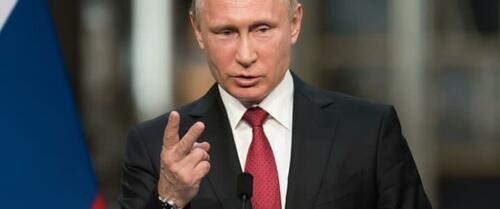Putin Has The Power To Intensify Europe’s Energy Crisis
By Haley Zaremba of OilPrice.com,
Summary
-
Europe’s energy crisis has already cost governments tens of billions of dollars and a looming confrontation with Russia would only make that worse.
-
European households are already set to see a 54% increase in the cost of gas and electricity despite the best efforts by governments to keep prices down
-
Russia provides about 40% of Europe’s natural gas, and if Russia does invade Ukraine and European governments respond with sanctions, there is a chance that supply could be cut off
Europe’s energy crunch is intensifying even as governments across the continent struggle to stop the crisis through stop-gap policy measures and subsidies. The past year has seen a stunning 330% surge in gas prices across European markets, hitting consumers extremely hard at the same time that the global economy is attempting to recover from and adapt to the ongoing novel coronavirus pandemic. To date, European governments have been largely helpless to stop skyrocketing inflation. The forces they are up against – economic, health, and political – far outgun the abilities of the European Union.
So far European leaders “have spent tens of billions of euros trying to shield consumers from record-high energy prices, and themselves from voters’ wrath” according to reporting and analysis by Reuters, but the efforts are going to fall far, far short of the economic fallout continuing to batter European consumers. “BofA analysts estimate the average western European households spent around 1,200 euros ($1,370) a year on gas and electricity in 2020,” Reuters writes. “Based on current wholesale prices, they estimate this will rise by 54% to 1,850 euros.”
Efforts to protect consumers and impose damage control on energy markets have included removing VAT taxes on home energy bills, sending relief directly to impoverished households, and, in some cases, staking moratoriums on crypto-currency mining, a remarkably energy-intensive practice that is sapping many Eastern European energy grids dry as miners capitalize on subsidized energy costs in poor countries including Kazakhstan and Kosovo. However, these measures don’t hold a candle to the crisis continuing to unfold. “Measures announced so far in western Europe will only cover about a quarter of the price rises on average,” Harry Wyburd, European utilities analyst at Bank of America Securities, was quoted by Reuters.
With inadequate policy power to combat the crisis and increasing geopolitical tensions in the region, the crisis is set to get much, much worse. Ubiquitous supply chain woes continue to disrupt the energy sector and render supplies unable to keep up with demand. Furthermore, geopolitics are making the situation worse as oil-rich Russia tightens its grip on Europe as the continent becomes increasingly dependent on the Kremlin to keep the lights on. Russia provides around 40% of Europe’s natural gas and over 50% of Germany’s. It has been speculated that Russian President Vladimir Putin is refusing to open the taps and meet Europe’s need for natural gas because of the leveraging power it gives Moscow to further their interests and push through initiatives such as the Nord Stream 2 pipeline.
The pipeline, which would pump Russian liquefied natural gas straight to Germany, bypassing Ukraine entirely by way of the Baltic Sea, is a point of major geopolitical tensions, as many in the west think that it would give the Kremlin far too much power over European markets, increasing Russia’s already prodigious political sway in the region. While the pipeline is already under construction, Moscow is waiting on the greenlight from Berlin to bring it online. Berlin, however, is under severe pressure to hold off on the project and avoid kowtowing to Russia, especially at a time when the nation’s aggression is becoming worryingly unchecked and an invasion of Ukraine is on the cards.
The potential coup brewing presents a major energy security threat to Europe at a time that the energy economy is already in crisis. “Should Russia choose to cut off the supplies in the middle of winter in response to the imposition of Ukraine-related sanctions, energy costs would skyrocket and millions could shiver amid power outages,” Axios reported on Monday in an article titled “Europe’s energy reliance on Russia is a crucial shield for Putin.” If this supply cut-off does indeed come to pass in retaliation to sanctions being threatened by world leaders including United States President Joe Biden, Goldman Sachs projects that the conflict could curb gas supply to Europe indefinitely.
Tyler Durden
Fri, 01/28/2022 – 05:00
via ZeroHedge News https://ift.tt/3IIksPI Tyler Durden
